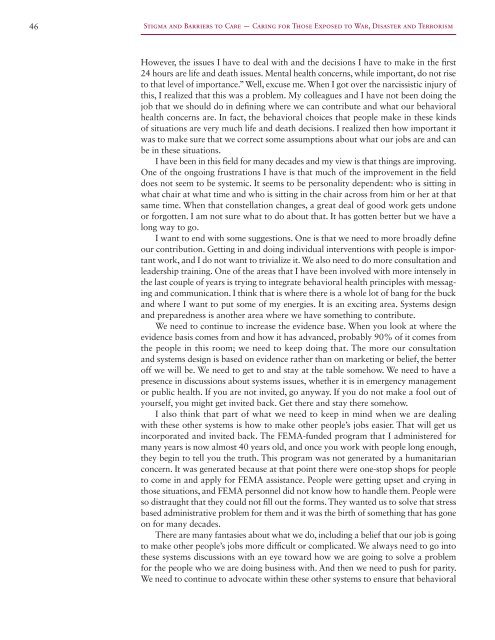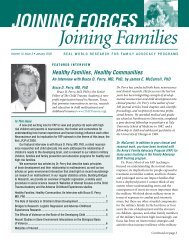stigma and barriers to care - Uniformed Services University of the ...
stigma and barriers to care - Uniformed Services University of the ...
stigma and barriers to care - Uniformed Services University of the ...
Create successful ePaper yourself
Turn your PDF publications into a flip-book with our unique Google optimized e-Paper software.
46<br />
Stigma <strong>and</strong> Barriers <strong>to</strong> Care — Caring for Those Exposed <strong>to</strong> War, Disaster <strong>and</strong> Terrorism<br />
However, <strong>the</strong> issues I have <strong>to</strong> deal with <strong>and</strong> <strong>the</strong> decisions I have <strong>to</strong> make in <strong>the</strong> first<br />
24 hours are life <strong>and</strong> death issues. Mental health concerns, while important, do not rise<br />
<strong>to</strong> that level <strong>of</strong> importance.” Well, excuse me. When I got over <strong>the</strong> narcissistic injury <strong>of</strong><br />
this, I realized that this was a problem. My colleagues <strong>and</strong> I have not been doing <strong>the</strong><br />
job that we should do in defining where we can contribute <strong>and</strong> what our behavioral<br />
health concerns are. In fact, <strong>the</strong> behavioral choices that people make in <strong>the</strong>se kinds<br />
<strong>of</strong> situations are very much life <strong>and</strong> death decisions. I realized <strong>the</strong>n how important it<br />
was <strong>to</strong> make sure that we correct some assumptions about what our jobs are <strong>and</strong> can<br />
be in <strong>the</strong>se situations.<br />
I have been in this field for many decades <strong>and</strong> my view is that things are improving.<br />
One <strong>of</strong> <strong>the</strong> ongoing frustrations I have is that much <strong>of</strong> <strong>the</strong> improvement in <strong>the</strong> field<br />
does not seem <strong>to</strong> be systemic. It seems <strong>to</strong> be personality dependent: who is sitting in<br />
what chair at what time <strong>and</strong> who is sitting in <strong>the</strong> chair across from him or her at that<br />
same time. When that constellation changes, a great deal <strong>of</strong> good work gets undone<br />
or forgotten. I am not sure what <strong>to</strong> do about that. It has gotten better but we have a<br />
long way <strong>to</strong> go.<br />
I want <strong>to</strong> end with some suggestions. One is that we need <strong>to</strong> more broadly define<br />
our contribution. Getting in <strong>and</strong> doing individual interventions with people is important<br />
work, <strong>and</strong> I do not want <strong>to</strong> trivialize it. We also need <strong>to</strong> do more consultation <strong>and</strong><br />
leadership training. One <strong>of</strong> <strong>the</strong> areas that I have been involved with more intensely in<br />
<strong>the</strong> last couple <strong>of</strong> years is trying <strong>to</strong> integrate behavioral health principles with messaging<br />
<strong>and</strong> communication. I think that is where <strong>the</strong>re is a whole lot <strong>of</strong> bang for <strong>the</strong> buck<br />
<strong>and</strong> where I want <strong>to</strong> put some <strong>of</strong> my energies. It is an exciting area. Systems design<br />
<strong>and</strong> preparedness is ano<strong>the</strong>r area where we have something <strong>to</strong> contribute.<br />
We need <strong>to</strong> continue <strong>to</strong> increase <strong>the</strong> evidence base. When you look at where <strong>the</strong><br />
evidence basis comes from <strong>and</strong> how it has advanced, probably 90% <strong>of</strong> it comes from<br />
<strong>the</strong> people in this room; we need <strong>to</strong> keep doing that. The more our consultation<br />
<strong>and</strong> systems design is based on evidence ra<strong>the</strong>r than on marketing or belief, <strong>the</strong> better<br />
<strong>of</strong>f we will be. We need <strong>to</strong> get <strong>to</strong> <strong>and</strong> stay at <strong>the</strong> table somehow. We need <strong>to</strong> have a<br />
presence in discussions about systems issues, whe<strong>the</strong>r it is in emergency management<br />
or public health. If you are not invited, go anyway. If you do not make a fool out <strong>of</strong><br />
yourself, you might get invited back. Get <strong>the</strong>re <strong>and</strong> stay <strong>the</strong>re somehow.<br />
I also think that part <strong>of</strong> what we need <strong>to</strong> keep in mind when we are dealing<br />
with <strong>the</strong>se o<strong>the</strong>r systems is how <strong>to</strong> make o<strong>the</strong>r people’s jobs easier. That will get us<br />
incorporated <strong>and</strong> invited back. The FEMA-funded program that I administered for<br />
many years is now almost 40 years old, <strong>and</strong> once you work with people long enough,<br />
<strong>the</strong>y begin <strong>to</strong> tell you <strong>the</strong> truth. This program was not generated by a humanitarian<br />
concern. It was generated because at that point <strong>the</strong>re were one-s<strong>to</strong>p shops for people<br />
<strong>to</strong> come in <strong>and</strong> apply for FEMA assistance. People were getting upset <strong>and</strong> crying in<br />
those situations, <strong>and</strong> FEMA personnel did not know how <strong>to</strong> h<strong>and</strong>le <strong>the</strong>m. People were<br />
so distraught that <strong>the</strong>y could not fill out <strong>the</strong> forms. They wanted us <strong>to</strong> solve that stress<br />
based administrative problem for <strong>the</strong>m <strong>and</strong> it was <strong>the</strong> birth <strong>of</strong> something that has gone<br />
on for many decades.<br />
There are many fantasies about what we do, including a belief that our job is going<br />
<strong>to</strong> make o<strong>the</strong>r people’s jobs more difficult or complicated. We always need <strong>to</strong> go in<strong>to</strong><br />
<strong>the</strong>se systems discussions with an eye <strong>to</strong>ward how we are going <strong>to</strong> solve a problem<br />
for <strong>the</strong> people who we are doing business with. And <strong>the</strong>n we need <strong>to</strong> push for parity.<br />
We need <strong>to</strong> continue <strong>to</strong> advocate within <strong>the</strong>se o<strong>the</strong>r systems <strong>to</strong> ensure that behavioral




